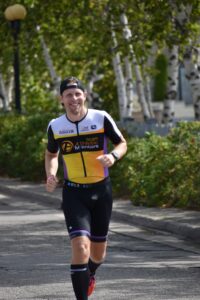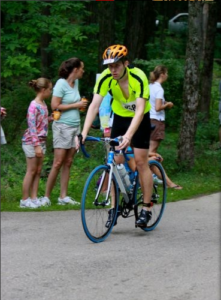Triathlons are a test of physical and mental endurance, requiring participants to excel in swimming, biking, and running. While many may believe that aging marks the decline of athletic prowess, this could not be further from the truth. With the right guidance and a commitment to consistent training, athletes can not only maintain but also enhance their performance in triathlons.
 In your 30’s, you might have more responsibilities and a busier schedule because of items such as kids and work. This makes the quality of your training sessions just as important as the quantity. By having a good coach and consistently following a training plan I have been able to go from a middle-of-the-pack athlete to one that is competing at the front of the race in both short and middle-distance triathlons.
In your 30’s, you might have more responsibilities and a busier schedule because of items such as kids and work. This makes the quality of your training sessions just as important as the quantity. By having a good coach and consistently following a training plan I have been able to go from a middle-of-the-pack athlete to one that is competing at the front of the race in both short and middle-distance triathlons.
In 2015, at the age of 30, I completed the Shermanator sprint triathlon, finishing in 27th place with a time of 1:07:48. While this was already a respectable feat, fast forward eight years to 2023, and I emerged as the overall winner of the Shermanator triathlon, completing the race in 53:32. The result is an example of the potential for improvement, even as one progresses through their 30s.
The Consistency Factor
While talent is undoubtedly important, consistency is the true cornerstone of success in any athletic endeavor. Maintaining a consistent training routine becomes even more critical. Here’s how consistent training impacts your triathlon journey:
- Building Endurance – Consistent training gradually builds endurance, which is crucial for completing the varying distances of a triathlon. Regular sessions condition your body to handle the demands of the race, preventing burnout on the big day.
- Muscle Memory – As you repeat the three disciplines of swimming, cycling, and running, your body develops muscle memory. This means your movements become more efficient, leading to improved performance and reduced energy expenditure.
- Moderating Plateaus – Progress isn’t always linear, and training plateaus are common. However, with consistent training, you can push through these plateaus and continue to see improvements over time.
- Injury Prevention – Consistency also plays a role in injury prevention. Gradually increasing your training load with regularity allows your body to adapt and grow stronger without succumbing to overuse injuries.
The Power of Coaching
A key factor in accelerating your progress in triathlons is the presence of a skilled and knowledgeable coach. Coaches bring a wealth of experience, technical expertise, and personalized guidance to the table, tailoring their approach to your individual needs and goals. Here’s how a good coach can make a significant difference:
- Customized Training Plans – A coach will design training plans that align with your current fitness level, taking into account any pre-existing conditions or limitations. This tailored approach minimizes the risk of injuries while maximizing progress.
- Goal Setting – A coach helps you set realistic yet challenging goals, breaking down your long-term objectives into smaller, achievable milestones. This approach keeps you motivated and focused on continuous improvement.
- Technical Expertise – Triathlons require mastering three distinct disciplines. A coach can refine your swimming technique, enhance your cycling efficiency, and optimize your running form. These technical adjustments lead to improved overall performance.
- Monitoring and Feedback – With regular assessments and feedback, coaches ensure that you’re on the right track. They can analyze your performance metrics, suggest adjustments, and provide insights for ongoing enhancement.
Training Smarter, Not Just Harder
In 2018, I undertook my first half-distance triathlon at the Grand Rapids Triathlon, completing the race in 5:30:33. Five years later, in 2023, a dramatic change in results unfolded when I crossed the finish line in 4:44:32. The highlight of this journey was the biking segment that allowed me to bridge to the front of the race and enter T2 in second place.
Embarking on a journey to complete and/or get faster at triathlons as you age is a testament to your determination and commitment to self-improvement. Through the guidance of a good coach and consistent training, you can shatter the misconception that age hinders athletic achievements. Remember that progress might be gradual, but each step forward brings you closer to realizing your full potential as a triathlete.
So, lace up your running shoes, hop on your bike, and dive into the pool with renewed vigor. With the right mindset and consistently following a well-structured approach, you can thrive as a triathlete well into your 30’s and beyond. The finish line awaits – and it’s never been closer.













